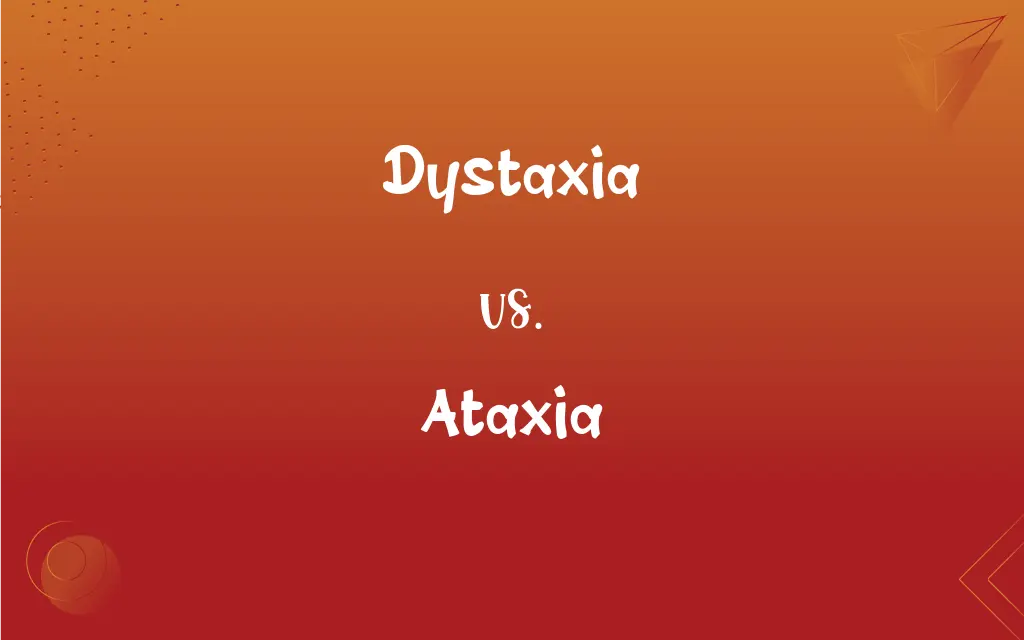Dystaxia vs. Ataxia: What's the Difference?
Edited by Aimie Carlson || By Harlon Moss || Updated on November 6, 2023
Ataxia refers to a lack of muscle coordination during voluntary movements, while dystaxia is a mild form of ataxia.

Key Differences
Dystaxia, a less commonly used term, suggests a milder disturbance in muscle coordination compared to ataxia. Ataxia describes a range of coordination disorders that can be severe.
Ataxia is often associated with cerebellar problems, which control balance and coordination. Dystaxia might not point to a specific origin but implies slight coordination difficulties.
Dystaxia can be considered a subset of ataxia, which encompasses various neurological signs, including those found in dystaxia. Ataxia covers more severe manifestations of coordination loss.
In medical contexts, ataxia is widely recognized and diagnosed, while dystaxia is not as frequently referred to. Ataxia can present with additional symptoms, such as eye movement issues.
Ataxia is a broader term, encompassing genetic, acute, and chronic forms. Dystaxia usually refers to milder, sometimes transient coordination problems.
ADVERTISEMENT
Comparison Chart
Severity
Generally milder symptoms.
Can range from mild to severe symptoms.
Usage
Less common in medical terminology.
Widely used in medical contexts.
Symptom Scope
Limited coordination issues.
Broad spectrum of coordination disorders.
Implication
Often implies temporary conditions.
Can indicate both acute and chronic conditions.
Recognition
Not a standard medical classification.
Recognized and categorized in medical literature.
ADVERTISEMENT
Dystaxia and Ataxia Definitions
Dystaxia
A mild coordination disorder.
After the injury, she experienced temporary dystaxia.
Ataxia
A condition where muscle control during voluntary movements is impaired.
Cerebellar ataxia affects his speech and gait.
Dystaxia
Minor difficulty in voluntary movements.
Dystaxia made buttoning his shirt frustrating.
Ataxia
Neurological sign characterized by lack of voluntary coordination.
Her ataxia was evident in the way she walked.
Dystaxia
A minor form of movement impairment.
The doctor noted mild dystaxia in her handwriting.
Ataxia
Disorder that affects balance, speech, and coordination.
Ataxia due to the disease progressed over time.
Dystaxia
Slight unsteadiness in motor functions.
She exhibited dystaxia when walking a straight line.
Ataxia
Loss of full control of bodily movements.
Ataxia made it difficult for him to maintain balance.
Dystaxia
Subtle disturbances in muscular control.
Dystaxia affected her ability to play the piano as before.
Ataxia
A symptom of various neurological diseases affecting movement.
Multiple sclerosis can present with ataxia.
Dystaxia
A milder or weaker form of ataxia
Ataxia
Loss of the ability to coordinate muscular movement.
Ataxia
Any of various degenerative, often hereditary, disorders that are characterized by ataxia and are frequently associated with cerebellar atrophy.
FAQs
Can dystaxia lead to ataxia?
Dystaxia is a milder form of ataxia, not typically a progressive condition.
Is dystaxia always temporary?
Dystaxia often refers to temporary coordination issues, but not exclusively.
What is ataxia?
Ataxia is a neurological disorder that affects balance, coordination, and speech.
What is dystaxia?
Dystaxia is a condition characterized by mild coordination difficulties.
Are dystaxia and ataxia genetic?
Ataxia can be genetic; dystaxia as a term is not typically used in genetic contexts.
Is dystaxia a medical diagnosis?
Dystaxia is not commonly used as a formal diagnosis.
Can ataxia worsen over time?
Some forms of ataxia may worsen, especially if untreated or progressive.
Can ataxia be treated?
Treatment for ataxia depends on the cause and can include physical therapy and medications.
Does ataxia affect children and adults equally?
Ataxia can affect individuals of any age, depending on the underlying cause.
Does ataxia affect intelligence?
Ataxia does not typically affect cognitive abilities.
Is there a cure for dystaxia?
Dystaxia is not a standalone condition; treatment focuses on the underlying cause.
Can ataxia be a sign of a serious disease?
Yes, ataxia can be a symptom of serious neurological diseases.
Can dystaxia be caused by an injury?
Yes, head injuries, for example, can temporarily cause symptoms of dystaxia.
Can stress exacerbate dystaxia or ataxia?
Stress may not cause these conditions but can worsen symptoms.
Are there specific tests for dystaxia?
There are no specific tests for dystaxia; it's evaluated within the context of ataxia.
Can alcohol cause ataxia?
Yes, excessive alcohol consumption can lead to a form of ataxia.
Is physical therapy beneficial for dystaxia?
Yes, physical therapy can help improve coordination in cases of dystaxia.
Are there medications for dystaxia?
Medications may address the underlying cause of the symptoms, rather than dystaxia specifically.
What lifestyle changes can help with ataxia?
Regular exercise, safety modifications, and a healthy diet may help manage ataxia.
Are dystaxia and ataxia lifelong conditions?
Dystaxia is often temporary, while ataxia varies depending on the type and cause.
About Author
Written by
Harlon MossHarlon is a seasoned quality moderator and accomplished content writer for Difference Wiki. An alumnus of the prestigious University of California, he earned his degree in Computer Science. Leveraging his academic background, Harlon brings a meticulous and informed perspective to his work, ensuring content accuracy and excellence.
Edited by
Aimie CarlsonAimie Carlson, holding a master's degree in English literature, is a fervent English language enthusiast. She lends her writing talents to Difference Wiki, a prominent website that specializes in comparisons, offering readers insightful analyses that both captivate and inform.































































